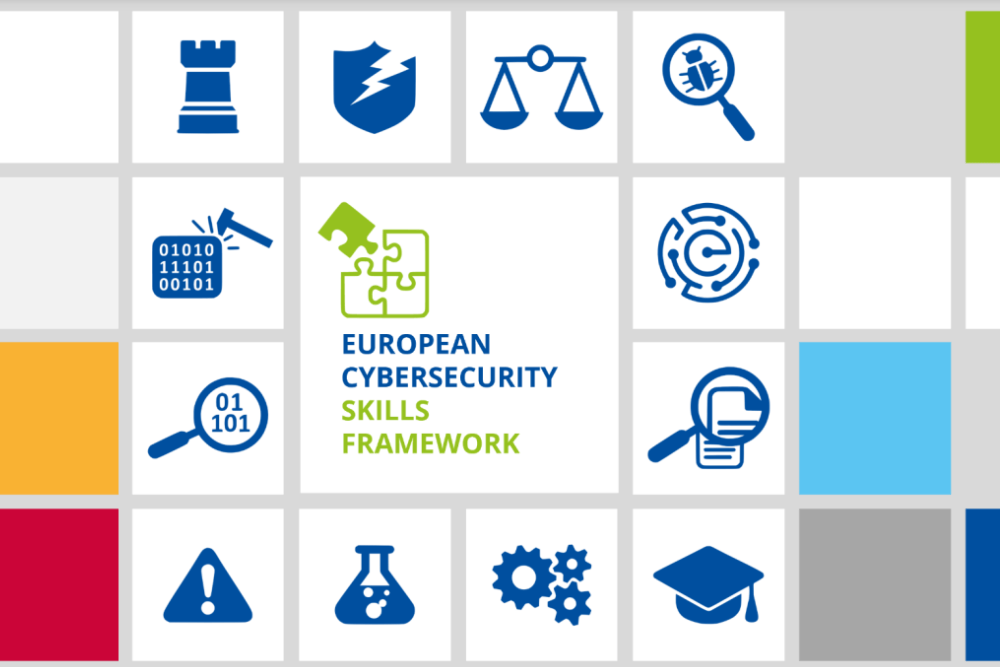The European Cybersecurity Skills Framework (ECSF): What it is and what it means for professionals
01 Nov, 2023
Min read

The European Cybersecurity Skills Framework (ECSF) condenses the various roles related to cybersecurity into 12 distinct profiles. Each of these profiles is thoroughly examined, offering detailed insights into their respective responsibilities, skill sets, cooperative aspects, and interconnections. This framework promotes a shared understanding of the pertinent roles, competencies, and knowledge crucial in the field of cybersecurity. Furthermore, it streamlines the recognition of cybersecurity skills and provides valuable support for the development of training programs related to cybersecurity.
The ECSF and its accompanying user manual were formally unveiled during the inaugural ENISA Cybersecurity Skills Conference held in September 2022.
The 12 Typical Roles in Cybersecurity
- Chief Information Security Officer (CISO): As the top cybersecurity executive, the CISO is responsible for developing and implementing an organisation's cybersecurity strategy, ensuring compliance with regulations, and managing the overall security posture.
- Cyber Incident Responder: These professionals are the first responders to security incidents. They investigate breaches, contain threats, and coordinate recovery efforts to minimise damage.
- Cyber Legal, Policy & Compliance Officer: This role focuses on the legal and compliance aspects of cybersecurity. Cyber legal experts ensure that the organisation adheres to cybersecurity regulations and policies.
- Cyber Threat Intelligence Specialist: These specialists analyse data to provide insights into emerging threats and vulnerabilities. They help organisations stay ahead of potential cyberattacks.
- Cybersecurity Architect: Cybersecurity architects design and implement security systems and strategies. They ensure that security measures are integrated effectively into an organisation's infrastructure.
- Cybersecurity Auditor: Auditors assess an organisation's security controls and policies to identify weaknesses and areas of improvement, helping to maintain a robust security posture.
- Cybersecurity Educator: Educators play a critical role in training employees and stakeholders on cybersecurity best practices, fostering a culture of security within the organisation.
- Cybersecurity Implementer: Implementers are responsible for deploying security solutions and configuring systems to meet cybersecurity requirements effectively.
- Cybersecurity Researcher: Researchers stay updated with the latest threats and vulnerabilities, conduct experiments, and develop innovative security solutions to protect against emerging risks.
- Cybersecurity Risk Manager: Risk managers assess, quantify, and manage cybersecurity risks. They help organisations make informed decisions to minimise potential threats.
- Digital Forensics Investigator: These experts investigate cybercrimes, analysing digital evidence to trace the source of an attack and provide evidence for legal proceedings.
- Penetration Tester: Penetration testers, also known as ethical hackers, simulate cyberattacks to identify vulnerabilities and weaknesses in an organisation's systems, helping to improve security measures.
Each of these roles plays a vital part in a comprehensive cybersecurity strategy. Together, they form a skilled and coordinated workforce that safeguards digital assets against evolving cyber threats.
These roles are just a snapshot of the diverse and evolving field of cybersecurity. Depending on the organisation's size, industry, and specific needs, cybersecurity teams may consist of individuals in one or more of these roles, working collaboratively to protect digital assets from a wide range of threats.
Our pathways and microcredentials are specifically designed to empower learners to design their own courses and take their own pathways with straightforward articulation and progression routes. Check out our courses here: https://www.cyberskills.ie/study/

.jpg)
.png)
